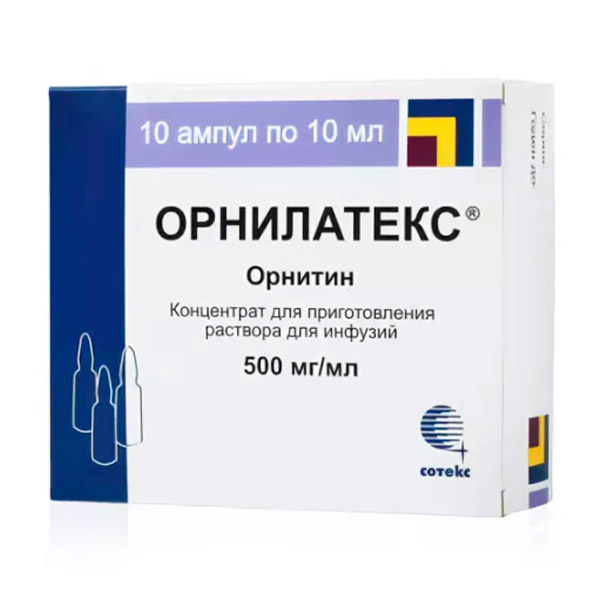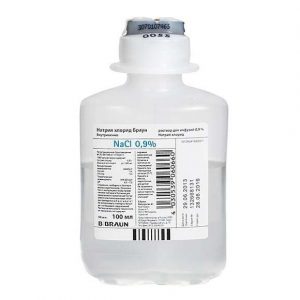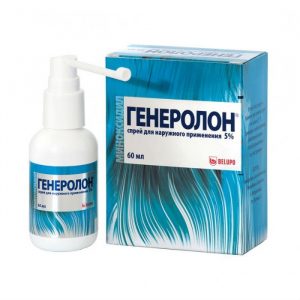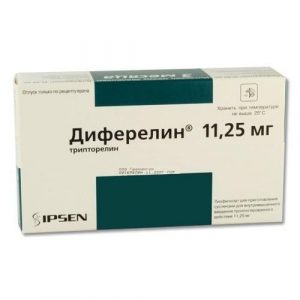Description
Pharmacological action
Pharmacological action – hypoazotemic. Pharmacodynamics Reduces the increased concentration of ammonia in the body, in particular with liver diseases. The effect of the drug is associated with its participation in the ornithine Krebs urea cycle (the formation of urea from ammonia). Ornithine acts as a catalyst for the enzymes carbamoylphosphate synthetase and ornithine carbamoyl transferase, and is also the basis for the synthesis of urea. In addition, the drug activates the ornithine urea formation cycle, which also helps reduce ammonia levels. Promotes the production of insulin and growth hormone. Improves protein metabolism in diseases requiring parenteral nutrition. In vivo pharmacokinetics form 2 active metabolites: aspartate and ornithine, having a short T1 / 2 of 0.3 ² 0.4 hours, are excreted by the kidneys through a urea cycle. A small part of aspartate is excreted by the kidneys unchanged.
Indications
acute and chronic liver diseases accompanied by hyperammonemia
hepatic encephalopathy, incl. as a part of complex therapy of impaired consciousness (precoma and coma)
as a corrective supplement to drugs for parenteral nutrition in patients with protein deficiency.
Contraindications
severe renal failure (serum creatinine> 3 mg / 1 dL)
hypersensitivity to the components of the
drug during breastfeeding
children under 18 years of age.
Special instructions
When administering the drug in high doses, the concentration of urea in blood plasma and urine should be monitored. In severe liver dysfunction, in accordance with the condition of the patient, it is necessary to reduce the rate of introduction of the infusion solution in order to prevent nausea or vomiting. Influence on the ability to drive vehicles and mechanisms. It does not affect the ability to drive a vehicle and potentially dangerous machinery.
Composition
Composition per 1 ampoule:
Active ingredient:
ornithine aspartate – 5, 0 g
Excipient:
water for injection up to 10 ml.
Dosage and administration
Intravenously (iv) drip. The contents of the ampoules are mixed with 500 ml of infusion solution (0.9% sodium chloride solution, 5% dextrose (glucose) solution or Ringer’s solution).
Adults
Average therapeutic dose of 20 g of ornithine per day.
With hepatic encephalopathy (depending on the severity of the condition), up to 40 g of ornithine per day is administered iv.
It is recommended to dissolve no more than 30 g of ornithine in 500 ml of infusion solution. The maximum infusion rate is 5 g of ornithine per hour.
The duration of drug therapy is determined in each case individually, based on the pathology and severity of the patient’s condition. In severe violations of liver function, strict monitoring of the patient s condition and correction of the rate of administration of the drug are necessary to prevent the development of nausea and vomiting.
Children
There is no data on the use of the drug in pediatric practice.
Side effects
Very rare (less than 0.01%): – nausea, vomiting
– allergic reactions.
Overdose
Symptoms: increased severity of dose-related side effects.
Treatment: the drug should be discontinued and symptomatic treatment given.
Storage conditions
In a dark place at a temperature of no higher than 25 ° C. Keep out of the reach of children.
Expiration
2 years
Pharmacy terms
Prescription




